When it comes to premium SEO tools, Ahrefs often tops the recommendation lists.
Known for its robust backlink analysis, accurate keyword data, and comprehensive site auditing capabilities, it’s widely trusted by digital marketers, agencies, and bloggers alike.
But with monthly plans starting at a significant price point, it’s fair to ask: Is Ahrefs worth it in 2025? Whether you’re an experienced SEO or just beginning your blogging journey, this review will help you evaluate whether Ahrefs justifies its cost based on your goals and strategy.
In this article, we’ll take a detailed look at Ahrefs’ core features, its pricing structure, how accurate its data really is, and how well it performs in real-world SEO workflows.
By the end, you’ll be able to assess whether Ahrefs is worth the money or if you’d be better off with a more affordable alternative.
Table Of Contents
What Is Ahrefs?
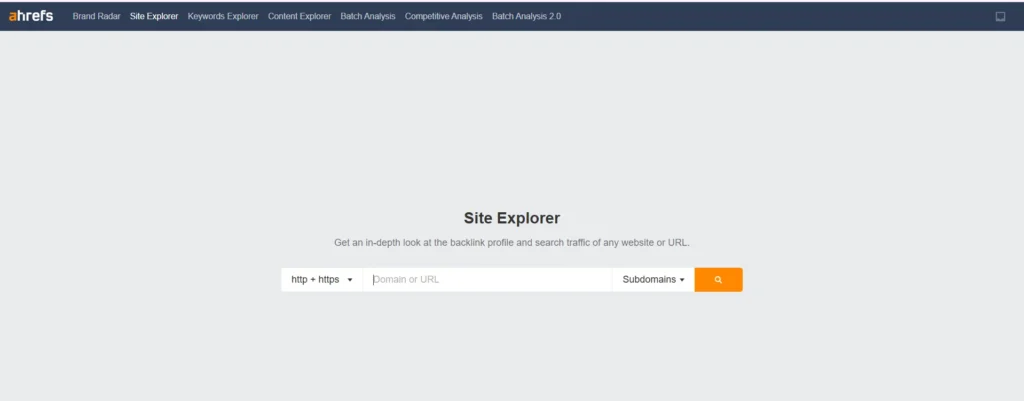
Ahrefs is a leading all-in-one SEO tool built to help marketers, bloggers, and businesses improve their visibility in search engines.
At its core, the platform offers powerful functionality for tracking keyword positions, conducting comprehensive backlink research, performing technical site audits, and analyzing competitor strategies.
Since its launch, Ahrefs has grown into one of the most widely trusted solutions in the digital marketing tools ecosystem.
The platform’s interface revolves around five core modules:
- Keywords Explorer: Supports data-driven keyword research using metrics like keyword difficulty, search volume, traffic potential, and SERP overview.
- Site Explorer: Offers a deep dive into backlink profiles and organic keyword data of any website, making it a strong competitor research tool.
- Site Audit Tool: Scans websites for technical SEO issues, crawling errors, and mobile usability performance.
- Content Explorer: Helps discover top-performing content and analyze link-building opportunities.
- Rank Tracker: Allows users to monitor SERP positions for target keywords over time across multiple search engines.
Ahrefs is recognized for its data accuracy and its ability to surface actionable insights.
Whether you’re planning content, fixing on-site SEO issues, or scaling your link building strategy, Ahrefs provides a cohesive experience that supports decision-making throughout your SEO workflow.
Who Should Use Ahrefs?
Ahrefs is a versatile platform that caters to a wide range of users regardless of whether you’re optimizing a personal blog or running large-scale enterprise SEO campaigns.
It’s particularly valuable for those who rely heavily on organic traffic and need actionable data to refine their digital strategies.
Here’s how Ahrefs supports different user groups:
- SEO Agencies: Ideal for managing multiple client projects, tracking rankings, and generating white-label reports. The platform’s backlink index and audit capabilities help uncover link gaps and technical flaws at scale.
- Bloggers & Niche Site Owners: Perfect for finding low-competition keywords, monitoring content performance, and analyzing competitors’ keyword strategies.
- Content Marketers: Useful for planning topic clusters, measuring content visibility, and uncovering trends using Content Explorer.
- eCommerce Businesses: Valuable for optimizing product and category pages, finding backlinks from relevant publishers, and diagnosing crawlability issues that affect site performance.
If you’re wondering, “Is Ahrefs worth it for beginners?” the answer depends on your level of commitment.
While the platform may appear overwhelming at first, its learning curve has been reduced significantly with tools like Ahrefs Academy, intuitive dashboards, and detailed help documentation.
For users serious about long-term SEO growth, the value far outweighs the initial complexity.
Ahrefs Tool Suite Explained: What You Actually Get
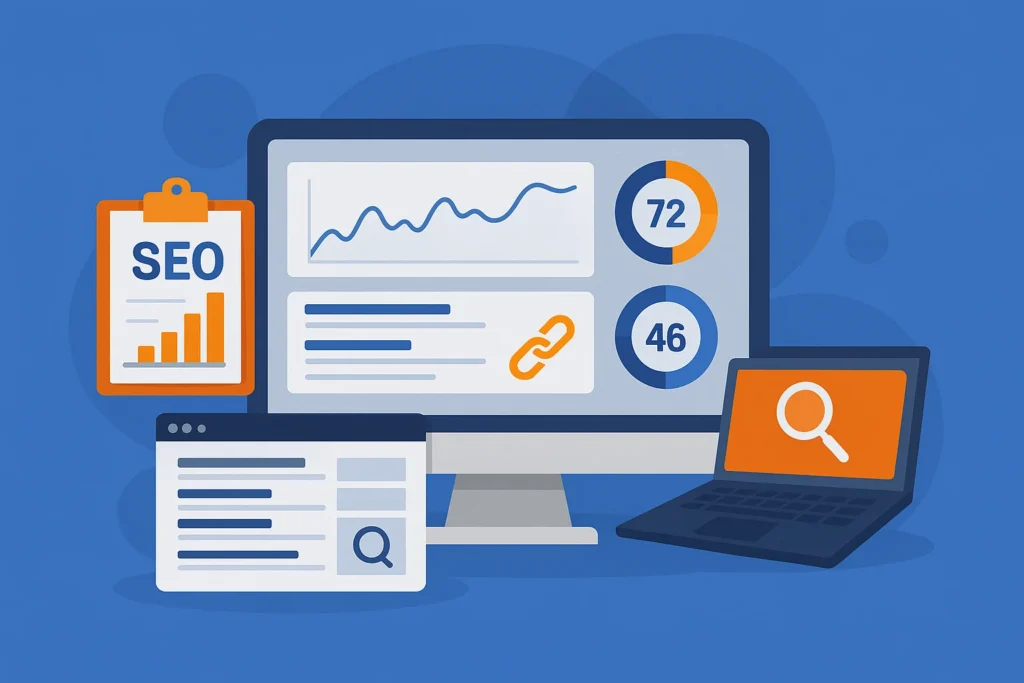
When evaluating whether Ahrefs is worth it, it’s essential to understand the depth of its toolset.
Ahrefs is not just a backlink checker it’s a comprehensive SEO tool that brings together several advanced modules designed for traffic analysis, keyword intelligence, technical health monitoring, and competitive benchmarking.
This section breaks down its two most relied-upon features: Site Explorer and Keywords Explorer, both of which play a crucial role in determining your site’s performance and identifying growth opportunities.
1. Site Explorer
The Site Explorer module is one of the most potent assets within Ahrefs.
It allows users to input any domain or URL and instantly access a wealth of competitive data.
You’ll see how much organic traffic a site gets, which keywords it ranks for, and the overall health of its backlink profile.
Two essential NLP entities at play here are Domain Rating (DR) and URL Rating (UR), which help you gauge the overall authority and link strength of a domain.
Whether you’re doing a domain authority check, analyzing inbound links, or scouting your competitor’s content strategy, Site Explorer gives you complete transparency into what’s working for others in your niche.
This tool is critical for competitor keyword analysis and identifying backlink gaps you can fill.
It even uncovers paid keywords your competitors are bidding on, helping bridge organic and PPC insights for broader strategy.
2. Keywords Explorer
If content is king, then keyword research is the kingdom, and Keywords Explorer is where Ahrefs truly shines.
It’s a robust database offering metrics that go far beyond search volume.
You get access to Keyword Difficulty (KD) scores, click potential, SERP overview, and traffic potential for each keyword.
This tool empowers users to find low-competition, high-reward opportunities and explore new keyword clusters based on search intent.
Whether you’re building out a content plan or targeting niche topics, the data in this module ensures search-driven insights back your content.
One of the most asked questions is: Is Ahrefs suitable for keyword research? Based on the richness of this tool’s metrics and the accuracy of its SERP data, the answer is a definitive yes.
Keywords Explorer helps both beginners and professionals align content with the right terms for better ranking visibility.
3. Rank Tracker
A significant part of any SEO campaign is knowing where your content stands in the search results.
That’s precisely what Ahrefs’ Rank Tracker helps you achieve.
Designed for long-term monitoring, this tool allows users to track keyword performance across multiple search engines and devices.
You can compare rankings against competitors, monitor historical trends, and evaluate how your optimizations impact visibility over time.
This feature plays a key role in understanding the performance of your SEO strategy at a glance.
Whether you’re targeting branded terms, long-tail keywords, or local phrases, the Rank Tracker provides real-time insights that align with your target audience’s behavior.
It supports multiple keyword groups, location targeting, and filters to segment your analysis.
With integrated SERP ranking tools, you can also track changes in the top-ranking pages and identify competitors that are gaining traction for your target terms.
These insights support smarter content updates and better decision-making for future campaigns.
4. Backlink Checker
Ahrefs is known for having one of the largest backlink databases, and its Backlink Checker is central to that reputation.
This tool lets you inspect the link profile of any domain, including your own or a competitor’s.
You can identify referring domains, anchor text usage, link quality, and the speed at which new links are acquired.
From an off-page SEO perspective, backlinks remain a crucial ranking factor, and Ahrefs gives you granular access to the data you need to build more innovative strategies.
The Backlink Checker is essential for uncovering toxic links, evaluating authority-building opportunities, and reverse-engineering what’s working for top-ranking competitors.
If your goal is to improve domain authority, drive referral traffic, or conduct effective link building, this module delivers clear, actionable insights.
You can also set alerts for new backlinks, helping you stay on top of recent link acquisition efforts.
5. Site Audit
When it comes to improving a website’s performance, identifying and fixing technical issues is crucial.
Ahrefs’ Site Audit Tool offers a comprehensive view of your website’s health, making it easier to locate and resolve problems that may hinder your rankings.
This tool scans for hundreds of issues, including broken links, redirect errors, slow-loading pages, and mobile usability problems.
It evaluates your site’s crawlability, internal linking structure, and overall indexing status factors that are essential for maintaining strong visibility in organic search.
As part of your technical SEO workflow, this module ensures that no underlying issues go unnoticed.
With visual reports and prioritized recommendations, the Site Audit helps web admins, SEO professionals, and agencies maintain site integrity and improve overall performance over time.
6. Content Explorer
Ahrefs’ Content Explorer is a powerful module designed to uncover trending content, measure performance, and identify content opportunities in your niche.
By entering any keyword or topic, users can find the most linked-to and shared content across the web.
This tool is invaluable for gap analysis, allowing you to see what your competitors are ranking for that you’re not.
You can discover high-performing articles, assess content freshness, and even analyze backlink profiles of top content, making it easier to plan your next blog post or outreach campaign.
For bloggers, affiliate marketers, and content teams, Content Explorer bridges the gap between keyword research and strategic execution.
It’s one of the best SEO tools for bloggers looking to align their content with audience interest and SERP demands.
7. Competitive Analysis Tools
One of Ahrefs’ standout capabilities is its suite of competitive analysis tools that allow users to benchmark against industry leaders.
These tools give you insight into domain-level comparisons, keyword overlaps, backlink gaps, and traffic potential from both organic and paid perspectives.
You can input up to five competing domains to visualize keyword intersections, familiar backlink sources, and performance metrics.
This feature is invaluable for building data-backed strategies that target gaps your competitors haven’t filled yet.
For users evaluating Semrush vs Ahrefs, it’s worth noting that while Semrush offers stronger integrations for PPC and content marketing, Ahrefs leads in backlink analysis and keyword data accuracy.
Ahrefs also maintains a cleaner, more focused user interface for those who prioritize SEO fundamentals.
Ahrefs Free Tools & AI Features – Is Free Really Valuable?
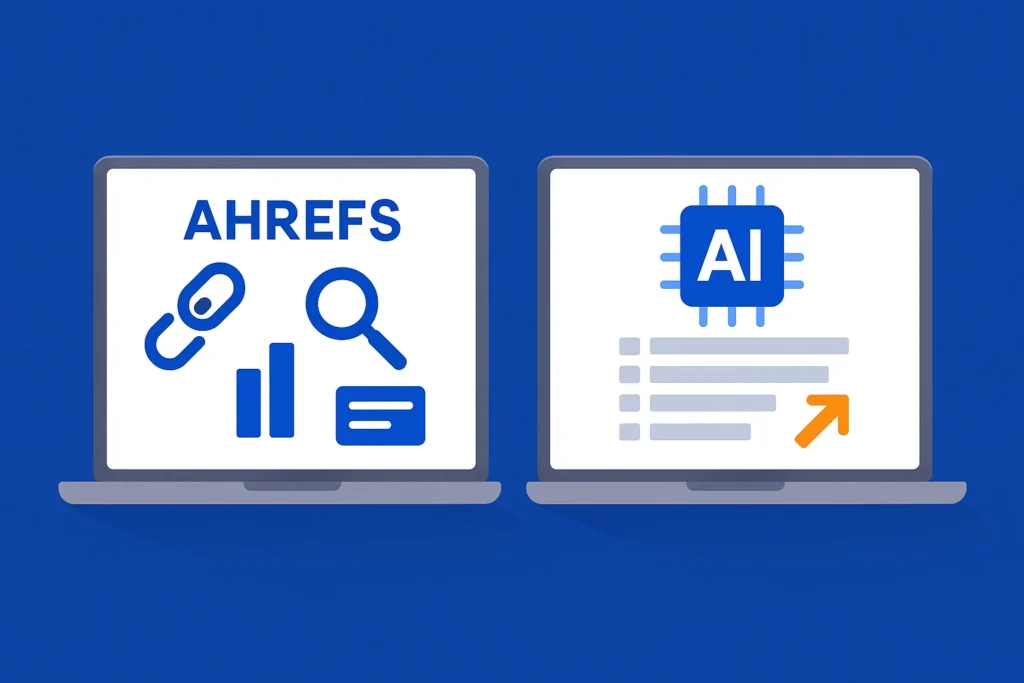
If you’re evaluating Ahrefs but aren’t ready to commit to a paid plan, you might be wondering: how much is Ahrefs worth if I’m using free tools?
Fortunately, Ahrefs offers a selection of powerful features at no cost, giving users a glimpse into what its platform can do before investing in a full subscription.
The Ahrefs Dashboard provides access to their Webmaster Tools, allowing verified site owners to perform basic audits and monitor backlink profiles.
It’s a valuable starting point for beginners who want to improve site performance without a budget.
Some of the best free tools offered by Ahrefs include:
- Backlink Checker: Offers a quick snapshot of top backlinks and referring domains
- Keyword Generator: Provides keyword ideas and estimated search volume for Google, YouTube, Amazon, and Bing.
- Website Authority Checker: Evaluates the authority of any domain using Domain Rating
- Broken Link Checker: Finds broken links on any page
- SERP Checker: Gives insight into the top 10 search results and fundamental keyword difficulty
- Ahrefs Webmaster Tools: Provides free site audits and performance insights for verified websites
In addition to these, Ahrefs has also started integrating AI-powered tools, such as:
- Content Generator (Beta): Helps brainstorm content outlines and titles based on entered keywords
- AI SERP Suggestions: Offers AI-based guidance on improving your ranking chances by understanding SERP patterns and content gaps
While these features are helpful, the free vs paid SEO tools debate comes down to depth.
The free versions often limit the number of results, don’t offer historic or complete SERP data, and lack tracking features.
If you’re running a serious content strategy, managing client work, or building backlinks at scale, the free tools will feel restrictive quickly.
That’s where the paid plans come in.
With full access to tools like Keywords Explorer, Rank Tracker, Content Explorer, and Site Explorer, users get deep analytics, actionable data, and scalability.
This contrast highlights why many professionals view the paid version as essential.
How Accurate Is Ahrefs?
For users asking how accurate is Ahrefs, the short answer is: highly reliable especially in the context of competitor analysis, backlink profiles, and keyword metrics.
But to fully understand its credibility, it’s important to examine how Ahrefs gathers and updates its data, and how that stacks up against tools like Google Search Console (GSC) and Semrush.
Ahrefs operates its independent crawler that mimics Google’s.
In fact, it’s one of the most significant web crawlers on the internet, second only to Google itself.
This gives Ahrefs the ability to maintain a vast and constantly updated database.
Their index is refreshed multiple times a day, ensuring that metrics such as organic traffic, backlink data, and keyword rankings are not only current but also actionable.
The data accuracy in Ahrefs is a direct result of its proprietary indexing system.
Unlike platforms that rely heavily on third-party APIs or static databases, Ahrefs captures live data, providing users with real-time shifts in traffic trends, SERP movements, and site changes.
When compared with Google Search Console, Ahrefs typically provides more expansive competitive data but may show slight differences in traffic estimation.
While GSC offers the most accurate first-party data for your site, it lacks visibility into competitors’ performance, something Ahrefs specializes in.
In contrast, tools like Semrush offer similar traffic and keyword analytics. Still, many users report that Ahrefs’ traffic estimator tools tend to be more consistent when analyzing smaller or niche websites.
Ahrefs also provides better transparency into data sources, crawl dates, and ranking volatility over time.
For anyone relying on precise numbers for SEO decisions, campaign tracking, or performance audits, Ahrefs’ data accuracy is a dependable asset, especially when combined with internal data from GSC or analytics platforms.
Pricing Plans – How Much Does Ahrefs Cost?
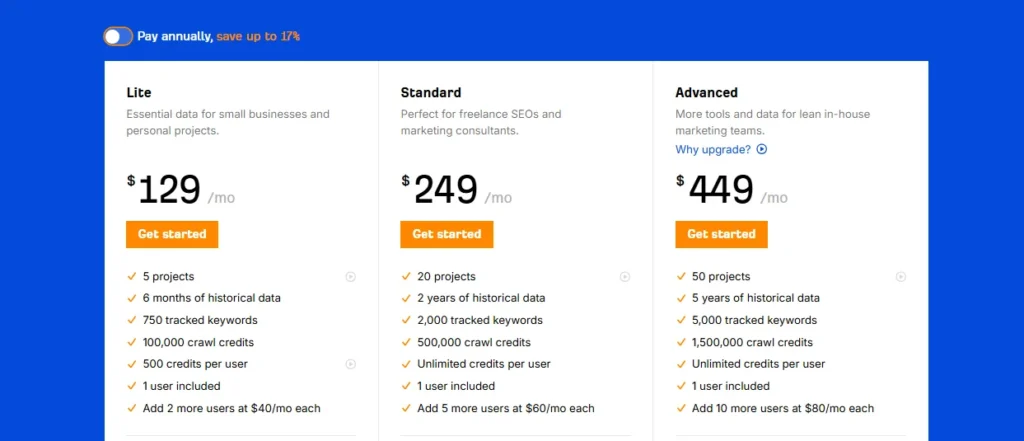
One of the most common questions from users considering Ahrefs is: How much does Ahrefs cost, and is the investment justified?
Ahrefs offers four pricing tiers tailored to meet the needs of individuals, marketers, agencies, and enterprises.
Each plan includes varying levels of data access, project capacity, and report limits, all aligned with usage intensity.
Ahrefs Pricing Breakdown
Pricing Summary:
- Lite: $129/month
- Standard: $249/month
- Advanced: $449/month
Each subscription plan offers monthly and annual billing options.
Opting for the yearly plan gives you two months free, making it more cost-effective for long-term users.
For individuals asking if Ahrefs is overpriced, it depends on your role and how often you use the platform. While the upfront cost is high compared to beginner tools, the features, update frequency, and data reliability justify the expense for serious users.
When weighing the ROI from an Ahrefs subscription, the key is in feature utilization.
Users who consistently run audits, build links, track rankings, and optimize content will find the value-for-money SEO tool well worth the investment.
Is Ahrefs Really Worth It? ROI, Scenarios & Outcomes
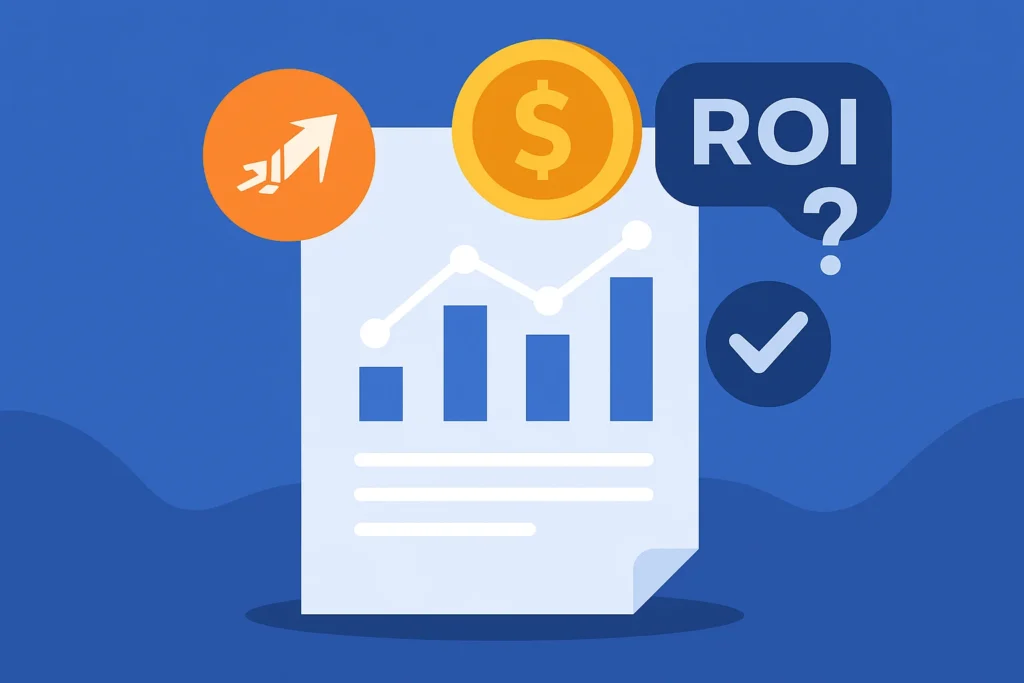
Understanding whether a premium SEO tool like Ahrefs is worth the investment depends on how it aligns with your goals, scale, and workflow.
To truly evaluate if Ahrefs is worth the money, we need to examine the cost-to-benefit ratio across different user profiles from beginners and bloggers to agencies and eCommerce businesses.
1. For Beginners & Entry-Level SEOs
If you’re just starting, the learning curve may feel steep.
However, Ahrefs has done a good job making its user interface intuitive and offering resources through Ahrefs Academy to flatten that curve.
The biggest challenge for beginners is the price, which can feel high if you’re not yet monetizing your content.
But if used consistently, even the Lite plan can help identify keywords, audit technical SEO issues, and monitor growth.
For users wondering if Ahrefs is profitable at the beginner stage, the answer depends on how aggressively you’re executing your SEO strategy.
2. For Bloggers & Niche Site Owners
Ahrefs is a powerful tool for content-focused SEO.
It helps bloggers identify content gaps, explore backlink opportunities, and analyze keyword performance.
Its ability to uncover what competitors are doing provides substantial leverage when planning topic clusters or authority-building campaigns.
Bloggers producing monetized or affiliate content will especially benefit from tracking top-performing pages and evaluating ROI from the Ahrefs subscription based on traffic and revenue growth.
3. For SEO Agencies & Teams
For agencies managing multiple domains or clients, Ahrefs becomes more than a tool—it’s a dashboard for strategic planning.
Features like Site Audit, Rank Tracker, and Backlink Checker help teams deliver transparent reports and drive measurable SEO outcomes.
In this scenario, the subscription plan pays for itself through client retention and campaign performance.
Agencies often view Ahrefs as an operational cost rather than an expense, which speaks directly to its profitability.
4. For eCommerce & Product-Based Businesses
For eCommerce, Ahrefs plays a crucial role in identifying product-based keyword opportunities, uncovering ranking difficulties, and tracking page-level performance.
The Keywords Explorer and Site Audit Tool help optimize category pages and improve site crawlability.
When paired with content marketing, Ahrefs becomes a core component in building organic traffic pipelines without relying solely on paid ads.
Ultimately, is Ahrefs worth it? Yes—for users who actively apply its insights to improve rankings, expand content, and strengthen off-page SEO.
Whether you’re scaling a personal blog or managing enterprise campaigns, the tool returns value proportionate to how well it’s used.
If you’re just exploring SEO lightly, the price might not feel justified.
But if growth is your goal, Ahrefs becomes an investment rather than a cost. Drawbacks & Limitations of Ahrefs
While Ahrefs is widely recognized as one of the most powerful SEO tools available, it’s essential to consider its limitations, especially if you’re evaluating it from a budget-conscious or usability-focused perspective.
For many users, these limitations are not deal-breakers. But depending on your goals, they could affect whether Ahrefs is worth it for your current stage of growth.
5. No Phone Support for Customers
Ahrefs relies heavily on its knowledge base, email support, and user communities for customer assistance.
While their support is responsive, there is no direct phone or live chat support, which can be frustrating if you’re dealing with urgent issues or need immediate clarification.
This limitation doesn’t affect tool functionality, but for agencies or teams managing client deliverables under tight deadlines, the lack of real-time assistance may add friction to your workflow.
6. No Dedicated Mobile App
Despite being a feature-rich desktop platform, Ahrefs does not offer a dedicated mobile app.
For users who need on-the-go access to keyword rankings, backlink updates, or site audits, this can be a limitation.
While the platform is technically accessible via mobile browser, the interface isn’t fully optimized for mobile responsiveness.
This affects tool usability for beginners who might rely on mobile devices as their primary workstations or check-ins.
Users comparing it to other SEO tools may find mobile access to be a missing piece in Ahrefs’ otherwise robust feature set.
7. Limited Free Trial Options
Ahrefs does not currently offer a full-featured free trial like some of its competitors.
Users can access basic features through Ahrefs Webmaster Tools, but this is restricted to verified websites only and lacks key tools such as Keywords Explorer and Rank Tracker.
This makes it difficult for prospective users to test the platform before committing financially, which leads many to question: Are the limitations a deal-breaker for my needs?
If you’re looking to explore SEO tools before making a purchase, the absence of a standard free trial could be a barrier to entry.
8. Not Budget-Friendly for Small-Scale Users
One of the most common critiques of Ahrefs is its pricing.
While justified by its features, the entry-level cost may not be feasible for solo bloggers, students, or early-stage startups.
Even the Lite plan can feel expensive if you’re not yet monetizing your site or running multiple SEO campaigns.
This brings us back to the overall cost-to-benefit ratio for smaller users.
If you’re only occasionally tracking keywords or auditing a single site, there may be more affordable alternatives that better suit your current needs.
In summary, while Ahrefs excels in data accuracy, backlink tracking, and keyword research, these drawbacks are worth considering if you’re looking for a more flexible or beginner-friendly solution.
For users with tighter budgets or mobile-first workflows, these limitations may shape your decision on whether to commit.
However, if you’re focused on professional-level SEO execution, Ahrefs still stands as a high-performing option.
Ahrefs vs Semrush: Which One Offers Better Value?
If you’re exploring premium SEO platforms, the most common decision marketers face is choosing between Ahrefs and Semrush.
Both tools offer robust features for keyword tracking, backlink analysis, and competitor monitoring, but they serve slightly different priorities.
Understanding these differences can help determine which platform delivers better value based on your SEO goals, campaign type, and workflow needs.
Ahrefs is known for its simplicity, backlink strength, and data accuracy, while Semrush stands out with PPC features, content marketing tools, and reporting depth.
For users asking semrush vs ahrefs—what’s better for my needs? the answer comes down to use case, not popularity.
1. Feature Comparison: Ahrefs vs Semrush
| Feature | Ahrefs | Semrush |
|---|---|---|
| Backlink Analysis | Strongest in the industry, detailed link metrics | Robust, but slightly behind Ahrefs |
| Keyword Research | Excellent keyword difficulty scoring, detailed SERPs | Strong keyword database with intent mapping |
| PPC Tools | Very limited | Full-featured PPC suite (Google Ads, PLA) |
| Site Audits | Technical SEO insights with health scoring | Deeper crawl analysis and task suggestions |
| Content Tools | Content Explorer + AI tools | Advanced content templates and topic research |
| User Interface (UI) | Clean, fast, data-focused | Rich UI, more cluttered for new users |
| Reports & Integrations | Simple reports, fewer integrations | Better white-label reports and marketing add-ons |
2. Strengths & Weaknesses
Ahrefs excels in backlink data, keyword explorer accuracy, and technical site auditing.
Its core strength lies in its simplicity and reliability. It’s ideal for SEOs who focus primarily on organic growth and need accurate tracking, historical keyword data, and in-depth link analysis.
However, Ahrefs lacks some functionalities that larger marketing teams may expect, such as PPC tools, social analytics, or robust content templates.
Additionally, its integrations and reporting options are more limited compared to Semrush.
Semrush, on the other hand, is more of an all-in-one marketing platform.
It includes social scheduling, ad research, advanced content optimization, and CRM integration.
For full-service agencies or digital marketers managing SEO, PPC, and content, Semrush delivers more breadth. But this comes with a steeper learning curve and a more complex interface.
Alternatives to Ahrefs – More Affordable Options
Ahrefs is a feature-rich and data-driven SEO tool, but for individuals and small teams operating on tighter budgets, it might not be the most accessible option.
Fortunately, there are several reliable budget SEO tools vs Ahrefs that offer a competitive set of features at a lower price point.
If you’re asking is there a cheaper alternative to Semrush or Ahrefs, the answer is yes and some of them come with free plans or extended trials that allow hands-on testing.
If you’re actively comparing tools or need more in-depth insights before making a decision, you can check out our detailed breakdown of the best Ahrefs alternatives.
That article explores pricing, core features, and use-case-based recommendations to help you find the right tool that fits both your SEO goals and your budget.
Ahrefs Learning Curve – Can Beginners Handle It?
Ahrefs is a feature-rich SEO platform, but one of the most common concerns new users have is whether it’s too complex to get started with.
So, if you’re asking whether Ahrefs is worth it for beginners, the short answer is yes but with the right learning support.
Despite its advanced capabilities, Ahrefs has made notable progress in improving its user interface (UI).
The dashboard is clean and navigable, offering immediate access to core tools like Site Explorer, Keywords Explorer, and Rank Tracker.
While some features may appear overwhelming at first, most modules include hover-based tooltips and visualizations that help explain metrics like Domain Rating, Keyword Difficulty, and traffic value.
To support onboarding, Ahrefs offers a wide range of educational resources through the Ahrefs Learning Center.
This includes beginner-friendly guides, interactive tutorials, and detailed explanations of tool functions.
Users can also access structured courses via Ahrefs Academy, which walks through everything from keyword research to backlink audits, complete with real examples and action steps.
If you prefer video learning, Ahrefs maintains a regularly updated YouTube channel and embedded video tutorials within relevant tool pages.
Their help docs and support center are well-organized, making it easy to troubleshoot or explore best practices on your own.
For anyone new to SEO, this layered approach to education turns what might seem like a steep learning curve into a guided experience.
While the platform is powerful, it doesn’t require expert-level knowledge to get started.
How Ahrefs Fits Into a Pro SEO Workflow
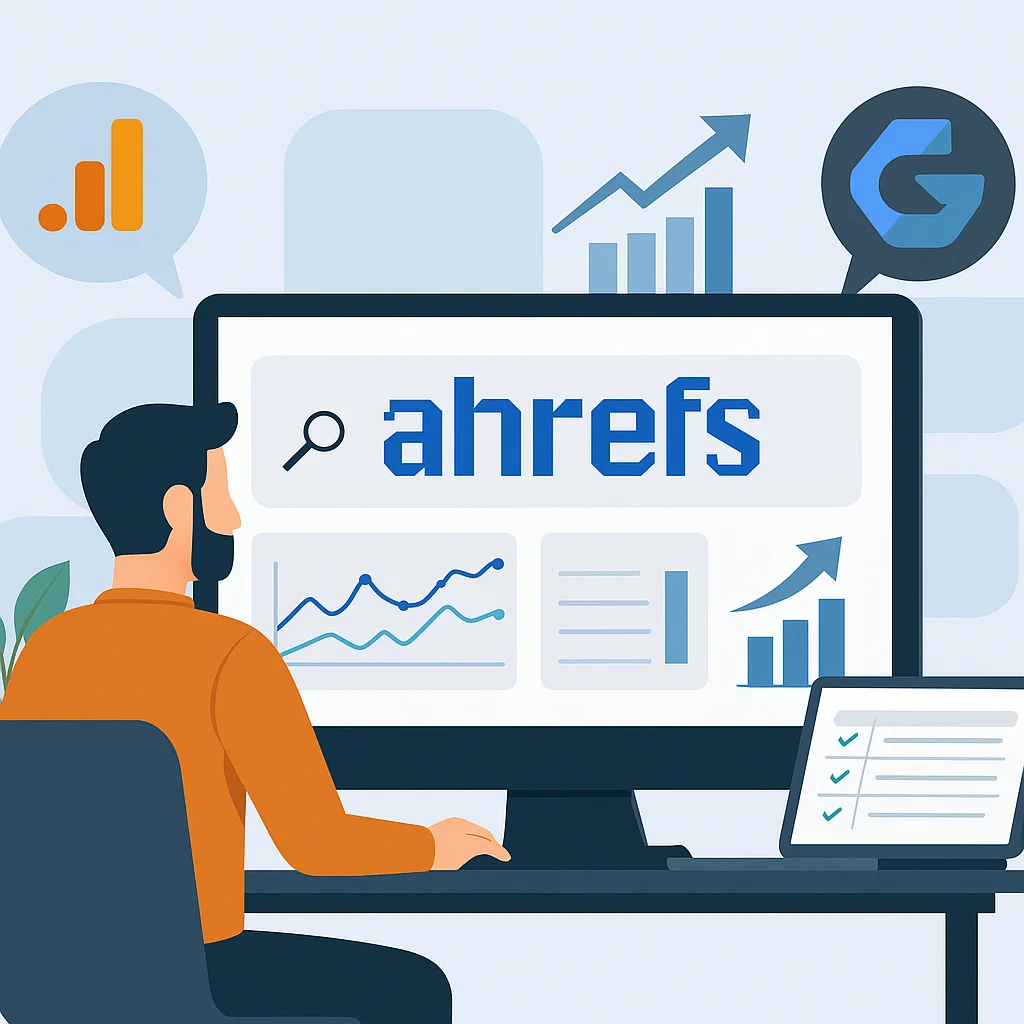
For SEO professionals and marketing teams managing multiple projects, the strength of any SEO tool lies not just in its features but in how well it fits into your existing workflow.
Whether you’re monitoring performance, building reports, or identifying strategic content opportunities, Ahrefs integrates naturally into most pro-level SEO routines.
Ahrefs acts as a central marketing analytics platform, offering quick access to keyword trends, backlink health, competitor insights, and technical site status.
Its daily-use modules like Keywords Explorer, Site Explorer, Rank Tracker, and Site Audit are designed for agile campaign adjustments and long-term planning.
How Professionals Use Ahrefs in Daily SEO Operations?
- Keyword Opportunity Mapping: SEOs use Keywords Explorer to prioritize content based on difficulty, search volume, and traffic potential. It aligns with GA4 and GSC data for performance validation.
- Backlink Monitoring: Agencies rely on Site Explorer and Alerts to track link-building progress and identify link losses or toxic backlinks. These insights are often exported into Google Sheets or Notion for collaboration and client reporting.
- Technical Health Checks: The Site Audit tool works hand-in-hand with Google Search Console, offering a deeper layer of issue prioritization, crawlability scoring, and technical insights.
- Competitor Tracking: Content marketers pull insights from Content Explorer and Domain Comparison to monitor competitor trends, which can be logged into Notion content calendars or SEO dashboards.
Ahrefs does not have direct integrations with GA4 or Google Search Console, but can be used alongside them to deepen data analysis.
Many teams import Ahrefs exports into tools like Google Sheets, Airtable, or Notion for client-facing reports, editorial planning, and performance dashboards.
This flexible workflow integration means Ahrefs can serve as the research and planning backbone for in-house SEO teams and external consultants alike.
It’s not just a standalone tool; it’s part of a connected ecosystem that supports everything from keyword discovery to execution and tracking.
Final Verdict – Is Ahrefs Worth the Money in 2025?
After evaluating Ahrefs from every angle features, accuracy, learning resources, workflow compatibility, pricing tiers, and use-case scenarios the real question remains: is Ahrefs worth it in 2025?
The answer depends on who you are and how deeply SEO is integrated into your strategy.
For content-driven marketers, growing bloggers, and SEO agencies, Ahrefs continues to be a high-value platform that delivers reliable data, accurate tracking, and competitive insights that support long-term organic growth.
Its strengths in backlink analysis, keyword research, and technical site audits make it a well-rounded solution for those who need a reliable daily-use SEO tool.
That said, the pricing can be a hurdle for freelancers or new site owners with limited budgets.
While the Ahrefs Lite Plan provides value, it may not satisfy those looking for full-scale features right away.
If you’re wondering how much Ahrefs is worth, the answer lies in how often you use its tools and whether you’re leveraging them to improve rankings, backlinks, and ROI.
For serious SEO practitioners and teams who manage multiple websites or clients, Ahrefs is more than just worth it becomes a foundational part of the workflow.
But if you’re still testing the waters, you may want to explore the free tools or alternative platforms before committing.
FAQs – Is Ahrefs Worth It?
Is Ahrefs good for SEO?
Yes, Ahrefs is one of the most comprehensive SEO platforms for keyword research, backlink analysis, and site auditing. It’s especially valuable for professionals who need accurate data for strategic decision-making.
Which is better, Ahrefs or Semrush?
Ahrefs is stronger in backlink analysis and simplicity, while Semrush offers broader digital marketing features, including PPC and social tools. The better option depends on your SEO focus and feature priorities.
How accurate is Ahrefs?
Ahrefs maintains one of the most extensive live indexes and updates data frequently. While it may slightly differ from Google Search Console, its estimates are considered reliable, especially for competitor tracking and backlink data.
Is Ahrefs profitable?
For users who consistently apply its tools—like content creators, agencies, and eCommerce businesses—Ahrefs can be highly profitable by improving visibility, traffic, and long-term search performance.
Is there a cheaper alternative to Semrush?
Yes. Tools like Ubersuggest, SE Ranking, and Serpstat offer similar functionality at a lower price point, though with some trade-offs in data depth and reporting features.
How does the data quality justify Ahrefs’ cost?
Ahrefs justifies its pricing through a frequently updated backlink index, real-time SERP tracking, and highly detailed keyword metrics that help professionals make informed decisions.
Would I benefit from Ahrefs’ traffic/site audit tools?
If you’re managing a growing site or multiple domains, the site audit and traffic tools offer actionable insights to improve technical SEO, fix crawl errors, and optimize for rankings.
Are the limitations and lack of trial a deal-breaker?
For some users, yes. The absence of a traditional free trial and the lack of a mobile app can be limiting. However, the depth of features often outweighs these drawbacks for regular users.
Can I manage SEO without a mobile app or phone support?
Yes, but it depends on your working style. While Ahrefs works on mobile browsers, it lacks a dedicated mobile app and phone support, which may not suit every workflow.
Also Read:
- Ahrefs vs SEMrush 2025 – Which SEO Tool Should You Use?
- 15+ Best Ahrefs Alternatives (Free, Paid & Open-Source Compared for 2025)
- SEMrush Free Trial 2025 – Get SEMrush 7 Days Trial + 10 Exclusive Bonuses



